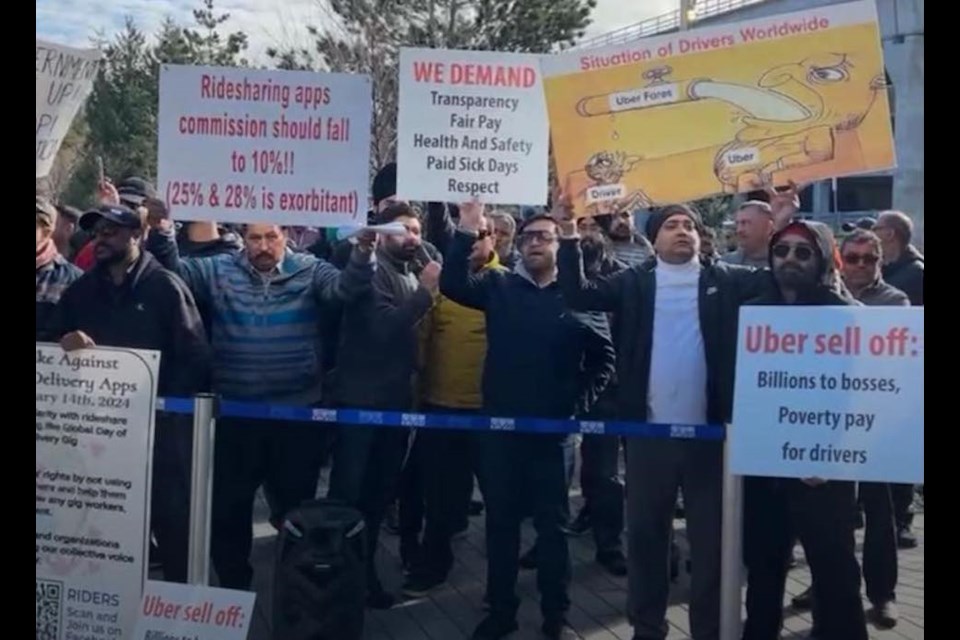Over 100 Uber and Lyft drivers gathered Wednesday (Feb. 14) near Vancouver International Airport (YVR) to protest working conditions and wages for an international day of "strike" action on Valentine's Day.
In B.C. and across Canada, rideshare and food delivery drivers aren't considered employees and aren't part of a union. While they can't hold an official strike, many of them have "gone dark" on their respective apps. In some cases, they plan to stay offline for 24 hours, while others plan not to provide services during the YVR protest.
The strike is held under the banner: "No love for Uber/Lyft this Valentine's Day!"
Vancouverite Kuljeet Singh has worked as a gig driver for over four years and says drivers aren't guaranteed to make B.C.'s minimum hourly wage and may still be blocked from working if a customer complains.
"It is not a human telling you [that] you did something wrong...it is the algorithm or the app," he told V.I.A. "No police complaint. No investigation...there's no video, no discussion."
After their account is blocked, drivers must appeal to Uber's support team, which often involves a call outside of the country for two or three hours.
Uber spokesperson Keerthana Rang told V.I.A. ahead of the strike that the company was aware of the strike but the company isn't expecting it to have a significant impact on operations.
"That’s because the vast majority of drivers are satisfied — earnings remain strong, and as of last quarter, drivers in Vancouver are making $36.03 during engaged time per hour before tips."
She also said Uber drivers who participate in the protest will not be deactivated or reprimanded.
"Uber never spoke to us about the strike."
But the protesting drivers said the company didn't address their concerns ahead of the protest and many of them aren't guaranteed to make minimum wage if rides aren't available during a lengthy shift.
"Uber never spoke to us about the strike," Singh told V.I.A. from Wednesday's protest at the airport. "They never talked to us about this."
The frustrated worker is one of many who say that B.C.'s major rideshare and food delivery companies have shortchanged workers, resulting in low wages and poor working conditions.
The large crowd gathered in the sunshine in Chester Johnson Park near YVR after 10 a.m. after they reportedly were told to move by airport staff.
People shouted: "We want our rights," "We want fair pay", "We need transparency," "Shame on Uber," "Shame on NDP," "We need security," and other chants throughout the demonstration.
Signs read things like "Independence equals poverty," "Uber Sell Out," "Honk to Support," "Uber drivers on strike," and other messages with worker demands and support slogans.
Singh said more drivers joined the crowd as the demonstration continued. He also spoke to drivers who were taking their services offline in support of the "strike" though they did not attend the gathering.
Uber/Lyft drivers want to be employees instead of "gig" workers
A Facebook group called BC(van) Uber/Lyft Drivers group, with upwards of 1,000 members, includes hundreds of drivers from across the Lower Mainland and many of them say they plan to join the protest. Singh streamed it live on the page.
Toronto-based Ejaz Butt, who is the secretary of the International Alliance of App-Based Transport Workers, says Canadian drivers are asking for several important changes.
Instead of being contract or "gig" workers, Uber and Lyft drivers want "employee status with a union." Currently, a driver could be on a 12-hour shift but might only work for three hours — and they won't be paid for the remaining time. This means they could end up making well below the minimum wage, Butt told V.I.A.
Drivers also say rideshare companies aren't transparent about what the customer pays for the trip.
"We want data shared with full transparency," he said.
Gig work includes paid work outside of traditional employment, including app-based ride-hailing and food-delivery work. These workers can typically set their hours.
The B.C. government has identified several issues with gig work over the past couple of years, including low and unpredictable wages, being cut off from the job without warning, and a lack of workers’ compensation coverage if injured on the job.
The Global Day of Strike against Transportation and Delivery Gig Corporations took place across cities across Canada, the United States, Mexico, and Britain on Feb. 14.
Lyft did not respond by V.I.A.'s deadline for comment on the story.



